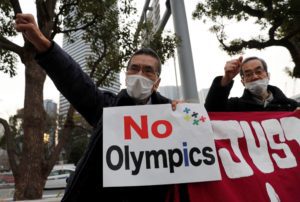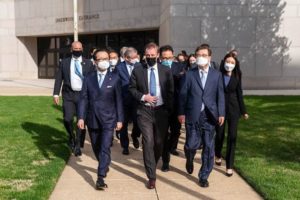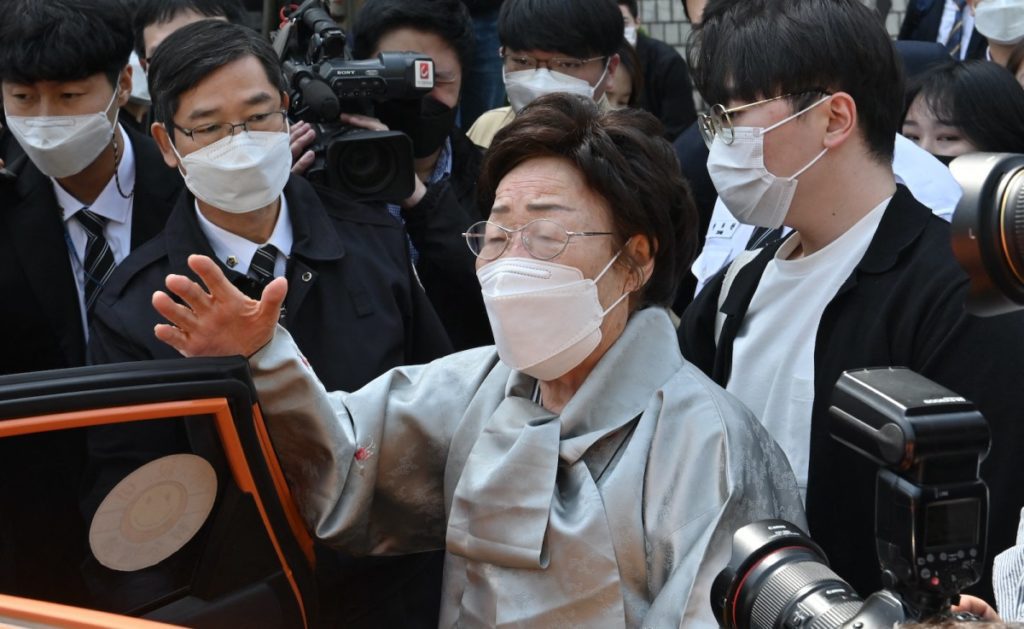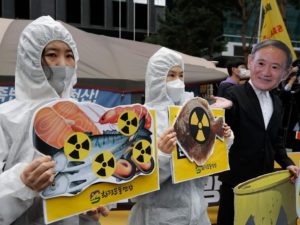Articles
Unsurprisingly, historical issues proved difficult to disentangle from other foreign policy issues in Japan-South Korea relations, which remained at the “worst level since the normalization” in the first four months of 2021. The Seoul Central District Court’s ruling on Jan. 8 that the Japanese government should pay damages to victims of sexual slavery during World War II set the tone for contentious relations at the beginning of the year. While the Moon Jae-in administration made gestures to mend ties, the Suga administration maintained that South Korea should take concrete measures to roll back the 2018 South Korean Supreme Court ruling on Japanese companies requiring them to compensate wartime forced laborers. Export restrictions levied by Japan against South Korean companies in 2019 remain in place, while the case is with the World Trade Organization after South Korea reopened a complaint in 2020 that was filed and then suspended in 2019.

Figure 1 Protesters call for the cancellation of the Tokyo Olympics in front of the organizing committee’s offices in Tokyo, February 2021. Photo: Reuters/Kim Kyung-Hoon
In 2021, two events could have created an opportunity for meaningful engagement to repair these frayed bilateral relations. The first is the inauguration of President Joseph Biden in the United States and his administration’s emphasis on Seoul-Tokyo-Washington trilateral cooperation. Developments in the first 100 days of the Biden administration suggest, however, that South Korean, Japanese, and US policy objectives and priorities concerning North Korea and China do not align. Trilateral cohesion might require significant policy coordination efforts.
The second is the Tokyo Summer Olympics, scheduled for July. The Moon and Suga administrations are interested in using this sporting event as a venue for engagement with North Korea. If Kim Jong Un decides to join (as Tokyo and Seoul hope), South Korea and Japan might have a chance to restore and increase diplomatic activities in pursuit of their policy goals toward Pyongyang. Chances appear slim at this point, however. North Korea declared in early April that it would not participate due to the pandemic, while many Japanese believe that the Olympics should be cancelled or postponed considering the public health risks.
The Biden Administration and Future of Trilateral Cooperation
Signaling the importance that the Biden team places on allies and partners in the Indo-Pacific region, Japan and South Korea, along with India, were the first destinations of international trips by Secretary of State Antony Blinken and Secretary of Defense Lloyd Austin. Both Seoul and Tokyo were able to reach military cost-sharing agreements with Washington early in 2021, which had been dragging on under the Trump administration. As the Biden administration’s Asia policy was taking shape, Japan and South Korea sought to put their respective alliance relationship with the United States on a solid footing, while also putting forward their policy preferences on North Korea and other regional affairs.
Remarks by South Korean President Moon and Japanese Prime Minister Suga Yoshihide on Jan. 18 are worth noting in this regard. In his policy speech at the opening of the Lower House parliamentary session, Suga reconfirmed that Japan would continue to pursue the Free and Open Indo-Pacific (FOIP) strategy, stressing the need to cooperate more tightly with the United States, Southeast Asian countries, Australia, India, and Europe. On relations with South Korea, he assessed that “bilateral relations are in an extremely severe situation,” calling South Korea “an important neighboring country,” which is a downgrade from “a critically important neighboring country” used in his previous policy speech.
Broadly speaking, Japan’s foreign policy outlook on regional security affairs, especially those involving China, converges with that of the Biden administration. In March, Japanese foreign and defense ministers and US Foreign and Defense secretaries issued a joint statement that “expressed serious concerns about recent disruptive developments in the region, such as the China Coast Guard law.” Tokyo received an assurance from the Biden administration that the Senkaku/Diaoyu islands fall under the US-Japan security treaty.
President Moon’s New Year’s press conference on Jan. 18 indicated that Seoul prioritizes a diplomatic breakthrough with North Korea over other foreign policy objectives. President Moon said, “the inauguration of the Biden administration would provide a turning point to newly start US-North Korea dialogue, South-North dialogue, to inherit the achievements that were made under the Trump administration. … The dialogue can pick up the pace if we restart from the Singapore declaration and seek concrete measures in the negotiation.” In January, South Korea’s Cabinet reshuffles reflected the desire to pursue this goal, known as the Korean Peninsula Peace Process, while working closely with the US. In late January, Moon also had a phone conversation with Chinese President Xi Jinping seeking China’s support for inter-Korean relations and US-DPRK talks.
As the first Quadrilateral Security Dialogue (Quad) leaders’ summit in March set the tone for the Biden administration’s Asia policy, South Korea’s reservations toward the Quad—of which Japan is a member—became a focus of domestic, as well as international, debate. In the context of the framework of FOIP and China policy, Korea observers were worried that Seoul’s alliance cohesion with Washington has been weakening, and that South Korea was being marginalized in regional affairs.

Figure 2 US National Security Advisor Jake Sullivan meets with National Security Secretariat Secretary General Shigeru Kitamura of Japan and National Security Advisor Suh Hoon of South Korea. Photo: Twitter/@WHNSC
Differing views and preferred policy options on North Korea can be a determinant of Seoul-Tokyo-Washington trilateral partnership under the Biden administration. After the US-Japan in-person summit in April, Washington and Tokyo confirmed that the goal is the “complete, verifiable, irreversible dismantlement of all of Pyongyang’s weapons of mass destruction and ballistic missiles of all ranges.” While the world awaits details of the new administration’s policy toward North Korea, Biden said, “we will empower our diplomats to work to reduce the threat posed by North Korea’s growing nuclear and missile programs, standing shoulder-to-shoulder with the Republic of Korea and Japan.” On April 2, US National Security Advisor Jake Sullivan, Japanese National Security Secretariat Secretary General Shigeru Kitamura, and South Korean National Security Office Director Suh Hoon held an in-person trilateral meeting at the United States Naval Academy. The press statement reads, “They agreed on the imperative for full implementation of relevant UN Security Council resolutions by the international community, including North Korea, preventing proliferation, and cooperating to strengthen deterrence and maintain peace and stability on the Korean Peninsula.” But the devil is in the details. It remains to be seen what specific measures the three countries will come up with, especially after the US-South Korea summit meeting scheduled to be held on May 21.
“Same Bed, Different (Olympic) Dreams”
The Moon administration has been working to improve relations with the Suga administration with its eye on the Tokyo Summer Olympics in July as an opportunity to engage with North Korea, likely in a similar fashion to the 2018 PyeongChang Winter Olympics. During his March 1 address that commemorated the 102th anniversary of the March First Independence Movement, President Moon suggested that he was ready for talks with Japan, noting that “bilateral cooperation will not only benefit our two countries but also facilitate stability and common prosperity in Northeast Asia and the trilateral Korea-United States-Japan partnership.” He stated, “the Olympic Games scheduled for this year may serve as an opportunity for dialogue between South Korea and Japan, South and North Korea, North Korea and the United States.”
In an interview with Japanese media, Kang Chang-il, South Korea’s new ambassador in Japan since January said, “President Moon Jae-in has a firm intention to rebuild South Korea-Japan relations and intensify cooperation with Japan,” adding that the president would be willing to do his utmost to support Japan’s successful Olympics this summer. As of early May, Kang had not met with Prime Minister Suga and Foreign Minister Motegi Toshimitsu.
On the first day of the Tokyo Olympic torch relay in late March, North Korea launched two short-range ballistic missiles into the sea near Japan, the first provocation since Biden came into office. Japan protested officially through its embassy in China. Criticizing the test as “a threat to peace and stability in Japan and the region,” Prime Minister Suga told reporters after an emergency National Security Council meeting that Japan “will closely cooperate with the United States, South Korea and other countries to firmly protect people’s peaceful lives.”
The Suga administration sees the Tokyo Olympics as a possible conduit to resolve the abduction issue, which has been foremost in Japan’s dealings with North Korea. Following his April 16 summit meeting with Biden, Suga reiterated that he would be willing to meet with North Korean leader Kim Jong Un “without precondition.” An important context of Suga’s desire to meet Kim is that Japan’s position of comprehensively resolving North Korea’s nuclear, missile, and abduction issues have not changed. In this vein, Tokyo’s unilateral sanctions on North Korea, first imposed over 10 years, were extended. During the Biden-Suga summit, Japan and the United States confirmed that they would work to strengthen deterrence against threats originating from North Korea. North Korea’s official Rodong Sinmun newspaper on April 18 responded by condemning Japan for “occupying the Korean [P]eninsula during the first half of the 20th century and engaging in a barbaric policy to annihilate the people.”
In early April, North Korea announced that it decided not to participate in the Summer Olympics out of concern about the pandemic. Both Tokyo and Seoul expressed hope that Pyongyang would change its mind. Suga said that the International Olympic Committee (IOC) and Tokyo “will sort the situation out.” Seoul submitted to IOC a joint bid to cohost the 2032 Summer Olympics with Pyongyang, in accordance with their September 2018 summit meeting between the two Koreas.
Two Rulings on “Comfort Women”
On Jan. 8, the Seoul Central District Court ruled that the Japanese government was responsible for compensating victims of wartime sexual slavery. A legal battle that had begun over seven years ago led to a ruling that the Japanese government should pay 100 million won (about $90,000) each to the 12 plaintiffs. Japan had refused to participate in the trial, citing state immunity, and the trial had proceeded in absentia.
In response to the ruling, Japan’s Foreign Ministry summoned outgoing South Korean Ambassador to Japan Nam Gwan-pyo to file a complaint. In a telephone call between South Korean Foreign Minister Kang Kyung-wha and Japanese Foreign Minister Motegi, Motegi requested that Seoul “take appropriate measures immediately to correct the violation of international law,” saying that the ruling went against a 2015 deal between the two governments. Kato Katsunobu, Japan’s chief Cabinet secretary, said Japan will not appeal the ruling because that would place Japan under South Korea’s jurisdiction. If the Japanese government does not appeal the district court ruling and refuses to pay compensation, South Korean courts can order the seizure of Japanese government assets in South Korea.
After the Jan. 8 ruling, President Moon is reported to have said, “I was frankly a bit thrown when the matter of the Comfort Woman judgment was added into things amid our efforts [toward a diplomatic resolution].” During the New Years’ press conference on Jan. 18, Moon said for the first time that it was “not desirable” that South Korean courts sell off the assets of Japanese companies to compensate wartime forced laborers, saying that Seoul will continue talks with Japan to explore a solution that the plaintiffs can agree with. On the 2015 agreement on the “Comfort Women” issue, he said that the “South Korean government recognizes it as an official agreement between the two countries.” Japan’s response was not what Seoul would have liked. Masahisa Sato, director of the ruling Liberal Democratic Party’s Foreign Affairs Division, commented, “it is we who are bewildered. [Moon’s comments] had nothing specific that could lead to a resolution.”

Figure 3 Former South Korean ‘comfort woman’ Lee Yong-soo speaks to the media after the Korean court’s April ruling. Photo: Jung Yeon-je/AFP
On April 21, in another ruling, a different chamber of the Seoul Central District Court rejected a compensation claim against the Japanese government by 20 individuals including survivors of wartime sexual slavery, citing Japan’s state immunity. At the heart of this ruling that contradicted the earlier January case was the question of state immunity, a legal principle that “protects a State and its property from the jurisdiction of the courts of another State.” Whereas the January ruling upheld that state immunity was not applicable due to Japan’s “crime against humanity,” Judge Min Seong-cheol said, “if an exception on state immunity is acknowledge, a diplomatic clash would be inevitable during the process of forcing the ruling’s implementation.” In response to this April ruling, Chief Cabinet Secretary Kato said, “as the Japanese government, we will continue to strongly ask the South Korean side for an appropriate action.” Lee Yong-soo, one of the plaintiffs and a victim, described the ruling “absurd, nonsense,” and urged the South Korean government to “take the issue to the International Court of Justice regardless of whether it produces a good or bad outcome.”
Disputes over Fukushima Waste Water

Figure 4 Activists denounce the Japanese government’s decision to release contaminated water from Fukushima outside the Japanese embassy in Seoul. Photo: Lee Jin-man/AP
The Japanese government’s announcement of its decision to release 1.25 million tons of treated wastewater from the Fukushima plant into the Pacific Ocean has caused diplomatic friction, triggering protests from South Korea as well as China and Taiwan. South Korea’s Second Vice Foreign Minister Choi Jong-moon summoned Japanese Ambassador to South Korea Aiboshi Koichi to protest the decision. President Moon requested officials to “proactively consider” bringing this to the International Tribunal for the Law of the Sea to stop Japan from dumping water into the ocean. Some 30 South Korean college students shaved their heads in front of the Japanese embassy in Seoul, protesting Japan’s decision.
In a roundtable meeting with Seoul, US Special Presidential Envoy for Climate John Kerry signaled that Washington would not intervene in the matter, saying that it would not be “appropriate.” Within Japan, the plan faced objections from the fisheries association as they are concerned about reputational damage to their products. A NHK survey showed that 51% of respondents are against the release while 18% support the decision. The release is scheduled to take place two years from now.
Looking to Summer 2021
Election losses of South Korean and Japanese ruling parties in by-elections in April amid falling approval ratings of both Suga and Moon mean that their immediate attention will be on domestic problems. Handling the pandemic is one of their shared top priorities. The Tokyo Olympics in July might potentially present Tokyo and Seoul with opportunities for diplomacy. But as of early May, it is unclear whether they will materialize. For South Korean leader Moon Jae-in, a successful summit with President Biden in late May will be a milestone for South Korean foreign policy at a point where Moon has one more year in office.
Chronology prepared by Patrice Francis, MA Student, American University’s School of International Service
Jan. 1, 2021: North Korea’s Korean Central News Agency (KCNA) reports that in a handwritten New Year’s card North Korean leader Kim Jong Un addresses the Korean people, offering thanks for their trust and support in the difficult times.
Jan. 5, 2021: North Korean leader Kim Jong Un convenes the Worker’s Party Congress in Pyongyang.
Jan. 7, 2021: Seoul Central District Court issues ruling ordering the Japanese government to compensate 12 plaintiffs who are victims of wartime sex slavery.
Jan. 7, 2021: KCNA reports that during a speech to the Worker’s Party Congress, North Korean leader Kim Jong Un expresses his determination to “place the state defense capabilities on a much higher level, and put forth goals for realizing it.”
Jan. 8, 2021: In a phone call, Japanese Foreign Vice Minister Akiba Takeo speaks to South Korean ambassador to Japan Nam Gwan-pyo about the South Korean court ruling issued against the Japanese government and says, “The ruling is extremely regrettable and the Japanese government absolutely cannot accept it.”
Jan. 9, 2021: South Korean Foreign Minister Kang Kyung-wha and Japanese Foreign Minister Motegi Toshimitsu talks on the phone. Motegi requests that Seoul “take appropriate measures immediately to correct the violation of international law.”
Jan. 11, 2021: South Korean Finance Minister Hong Nam-ki said that South Korea will review membership in the Comprehensive and Progressive Agreement for Trans-Pacific Partnership (CPTPP). Previously President Moon had, during his New Years’ Message, said South Korea would positively review joining the CPTPP.
Jan. 13, 2021: Suga said that he would seek dialogue with North Korean leader Kim Jong Un “without precondition” by taking advantage of the Summer Olympics in Tokyo in July.
Jan. 17, 2021: Kang Chang-il, as South Korea’s new ambassador in Japan, signals South Korea’s willingness to mend ties in an interview with Japanese media, saying “President Moon Jae-in has a firm intention to rebuild South Korea-Japan relations and intensify cooperation with Japan.”
Jan. 18, 2021: Japanese Prime Minister Suga Yoshihide delivers his policy speech at the opening of the Lower House parliamentary session.
Jan. 18, 2021: At a New Year’s news conference South Korean President Moon Jae-in says, “The inauguration of the Biden administration would provide a turning point to newly start US-North Korea dialogue, South-North dialogue, to inherit the achievements that were made under the Trump administration.”
Jan. 20, 2021: Joseph Biden is inaugurated as president of the United States.
Jan. 23-24, 2021: Asahi Shimbun survey shows that the approval rating for Suga’s cabinet went down to 33% from 65% when Suga took office in September 2020.
Jan. 26, 2021: South Korea’s Bank of Korea announces that South Korea’s real gross domestic product fell by 1% in 2020, marking the lowest growth rate in 22 years.
Feb. 5, 2021: In a statement, South Korea’s Ministry of Trade, Industry and Energy says that South Korean Minister of Trade Yoo Myung-hee will drop her bid to be World Trade Organization director-general.
March 1, 2021: During a ceremony for March 1 Independence Day, South Korean President Moon Jae-in says, “The [Olympic] Games scheduled for this year may serve as an opportunity for dialogue between South Korea and Japan, South and North Korea, North Korea and Japan, and North Korea and the United States.”
March 7, 2021: Seoul’s Joint Chiefs of Staff issue a statement saying that after a review of the pandemic and diplomatic efforts, the March US-South Korean joint military drills will be scaled down.
March 16-17, 2021: US Secretary of State Anthony Blinken and Secretary of Defense Lloyd J. Austin III attend the US–Japan Security Consultative Committee (“2+2”) meeting in Tokyo. The meeting is hosted by Japan’s Minister for Foreign Affairs Motegi Toshimitsu and Minister of Defense Nobuo Kishi.
March 17-18, 2021: US Secretary of State Blinken and Secretary of Defense Austin attend a US-ROK Foreign and Defense Ministerial (“2+2”) in Seoul. The meeting is hosted by the ROK’s Foreign Minister Chung Eui-yong and Minister of Defense Suh Wook.
March 25, 2021: North Korea launches two ballistic missiles into the sea near Japan. Prime Minister Suga calls an emergency meeting of the National Security Council and says that Japan will closely cooperate with the US, South Korea, and other countries.
March 30, 2021: Japan’s Ministry of Education authorizes 30 social studies textbooks for the 2022 school year which assert that the Takeshima/Dokdo and Senkaku/Diaoyu islands are a part of Japanese territory. South Korea’s Foreign Ministry spokesman Choi Young-sam responds by saying, “we cannot help but deplore and strongly condemn the approval of the textbooks carrying ungrounded claims to Dokdo, which is clearly our indigenous territory historically, geographically and by international law.”
March 31, 2021: UN Security Council committee on North Korea sanctions expert panel releases report indicating that “cyberactors linked to the Democratic People’s Republic of Korea continued to conduct operations against financial institutions and virtual currency exchange houses in 2020 to generate revenue to support its weapons of mass destruction.”
April 2, 2021: Blue House National Security Office Director Suh Hoon, Japan National Security Secretariat Secretary General Shigeru Kitamura, and US National Security Advisor Jake Sullivan hold trilateral talks at the United States Naval Academy in Annapolis, Maryland.
April 3, 2021: South Korean Foreign Minister Chung Eui-yong meets with Chinese counterpart Foreign Minister Wang Yi in Fujian Province to discuss bilateral relations.
April 5, 2021: A report on North Korean Sports Ministry website DPRK Korea states that the North Korean Olympic Committee “decided not to participate in the 32nd Olympic Games in order to protect players from the world public health crisis caused by COVID-19.”
April 7, 2021: During a press briefing in Washington, DC White House spokesperson Jen Psaki says “We have a clear objective as it relates to North Korea, denuclearizing the Korean Peninsula” and “We are prepared to consider some form of diplomacy, if it’s going to lead us down the path toward denuclearization.”
April 8, 2021: South Korean First Vice Foreign Minister Choi Jong-kun and US Acting Ambassador to Seoul Robert Rapson formally sign the 11th Special Measures Agreement six-year defense cost-sharing arrangement at the Seoul government complex.
April 13, 2021: During a press conference after a meeting at a Seoul government complex, head of Korea’s Office for Government Policy Coordination Koo Yun-cheol says “The Korean government expresses strong regret over the Japanese government’s decision to release contaminated water from the Fukushima nuclear power plant into the ocean, and plans to take all necessary measures keeping the safety of our people as the top priority.”
April 14, 2021: South Korean presidential spokesperson Kang Min-seok says that “at a Blue House meeting the president ordered his aides to actively examine ways to bring Japan’s decision to release contaminated water from [the Fukushima] nuclear plant to the International Tribunal for the Law of the Sea.”
April 14, 2021: During a reception held after a credentials presenting ceremony, South Korean President Moon Jae-in tells Japanese Ambassador to South Korea Aiboshi Koichi that “Korea has extremely serious concerns over Japan’s decision to release contaminated water from the nuclear plant into the sea because our geographic location is the closest and the two countries share the sea.”
April 14, 2021: In response to Japan’s decision to release the contaminated Fukushima plant water, South Korean DP Rep. Shin Dong-kun says “It is very disappointing that the United States, our [traditional] ally, sided with Japan.” Acting DP leader Rep. Do Jong-hwan says, “We denounce the Japanese government for making the decision without offering transparent information and a verification process.”
April 16, 2021: President Biden and Prime Minister Suga hold an in-person summit meeting.
April 16, 2021: Judge Kim Yang-ho issues ruling in Seoul Central District Court authorizing collection of the legal fees from the Japanese government for 12 plaintiffs that sued the Japanese government for compensation for wartime suffering as comfort women.
April 18, 2021: During a roundtable meeting with media, US special climate envoy John Kerry responds to questions about US involvement in Japan’s release of contaminated water from the Fukushima plant. John Kerry says, “We don’t think it is appropriate for the US to jump into the process that’s already underway and where there are very clear rules and expectations.”
April 21, 2021: Seoul Central District Court rejects a compensation claim against the Japanese government by 20 individuals including survivors of wartime sex slavery, citing sovereign immunity.
April 30, 2021: According to a Gallup Korea poll, President Moon’s approval rating dropped to 29%, the lowest since his inauguration. Respondents cited real estate policies, the handling of the pandemic, economy and people’s livelihood as reasons for the drop.